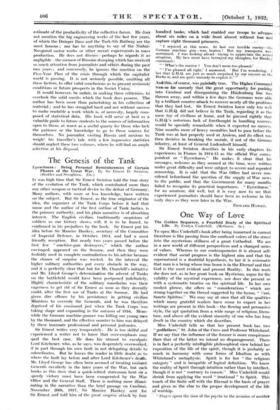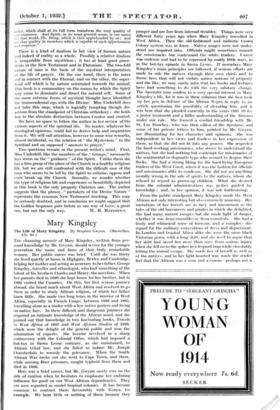One Way of Love
The Golden Sequence, a Fourfold Study of the Spiritual Life. By Evelyn Underhill. (Methuen. 5s.)
To open Miss Underhill's book after being immersed in current literature is like passing from the confused voices of the street into the mysterious stillness of a great Cathedral. We are in a new world of different perspectives and a changed series of values. Whereas to our contemporaries it is almost self- evident that social progress is the highest aim and that the supernatural is a doubtful hypothesis, to her it is axiomatic that man is a being whose true home is in the Eternal and that God is the most evident and present Reality. In this work she does not, as in her great book on Mysticism, argue for the validity' of the mystical experience, nor does she present us with a systematic treatise on the spiritual life. In her own modeSt phrase, she offers us " considerations " which are strung together on the thread suggested by the hymn, " \Ten', Sancte Spiritus." We may say at once that all the qualities which.' many grateful' readers have come to expect in her Writings are present in this book—the flowing and persuasive style, the apt quotation from a wide range of religious litera- ture, and above all the evident sincerity of one who has long dwelt in the country which she describes. - - - Miss Underhill tells us that her present book has two " godfathers," St. John of-the Cross and Professor Whitehead. If we say that the influence of the former is more conspicuous than' that of the latter we intend no disparagement. There is in fact a perfectly intelligible philosophical view behind her 'exposition of the life of the spirit, though -it is probably as Mitch in harmony with some forms of Idealism as with Whitehead's metaphysic. Spirit is for her " the religious category " and is incapable of logical definition. • We know the reality of Spirit through intuition rather than by intellect, 'though it is not contrary to reason." Miss Underhill would Shrink from applying the word " irrational " to Spirit. This touch of the -finite self withthe Eternal is the basis of prayer 'and giveis us the clue- to the -proper development of the life Of weiship.
" Pin3ier opens the door of the psyChe (he invasion of another or.der„ whioh shall /alto full. term _transform _ the:very:quality' of our existence._ And Spirit, in its most,genetal sense, is out. name that world, life, Being, whic-h-is then apprehended li .ts-; and for that quality iii ourselves which is -eatable of such tip-Weherniiciri and response.
There. Is a kind of dualisat -.1rei view of human nature and indeed of reality as a whole. Possibly a relative dualism is inseparable from mysticism ; it has at least good prece- dents in the New Testament and in Platonism. The two-fold nature of 'than is the basis of the mystical interpretation of the life of prayer. On the one hand, there is the inner self in contact with the Eternal, and on the other, the super- ficial self whieh'iS by nature orientated" towards the animal.
Thia'book is a commentary.on the Means by which the Spirit may &line fO'dtiminate and direct the natural self. Some of the" more extreme forms of mystical thought have identified the transcendental ego' with the Divine. Miss Underhill does not take this step, which is logically tempting though dis- astrous from the standpoint of Christian orthodoxy ; she holds fast to the absolute distinction between Creator and created. We have no space to follow the author in her review of the various aspects Of the spiritual life. No reader, whatever his theological opinions, could fail to derive help and inspiration from it.' We will call attention, however to some wise remarks, almost incidental, on the relation of " the Mysterious " to the Spiritual and on supposed " answers to prayer."
Two questions remain in the present writer's mind. First, Miss Underhill, like the members of the " Groups," necessarily lays stress on the 'guidance " of the Spirit. Unlike them she has a firm grasp of the place of the Church in a healthy religious life, but we are still confronted with the difficult case of the man who seems to be led by the Spirit to criticise, oppose and even break up the Church. Secondly, we wonder whether the type of religious life and experience so beautifully depicted in this book is the only properly Christian one, The author suggests that the phrase, " partakers of the Divine Nature " represents the common New Testament teaching. This may be seriously doubted, and in conclusion we might suggest that the Golden Sequence puts before us one way of Love, a great















































 Previous page
Previous page